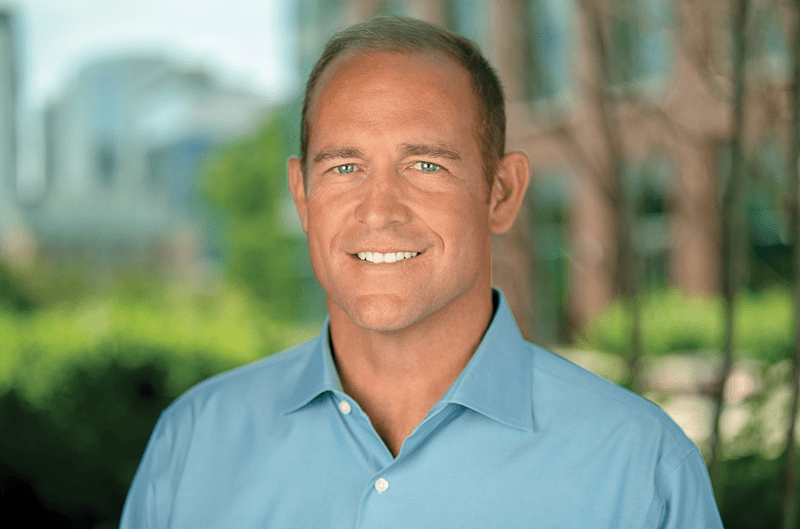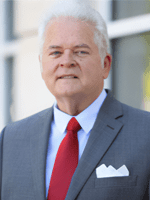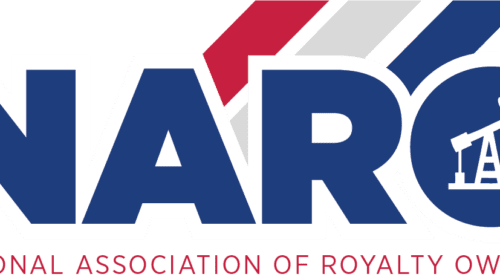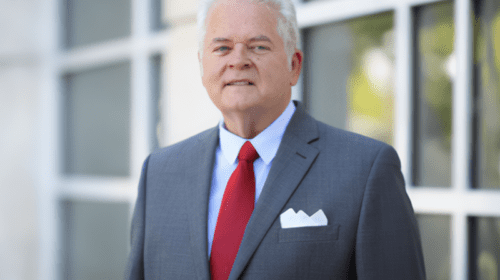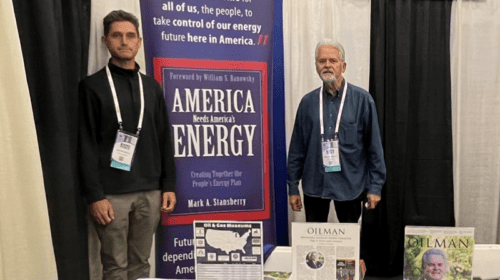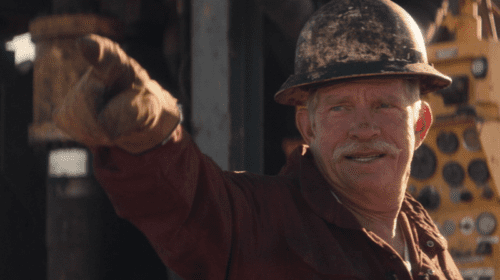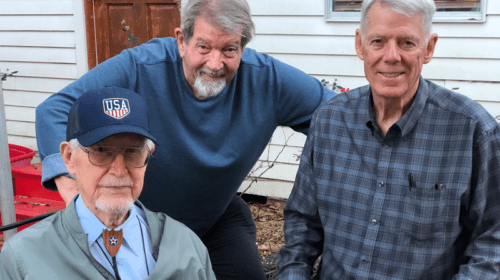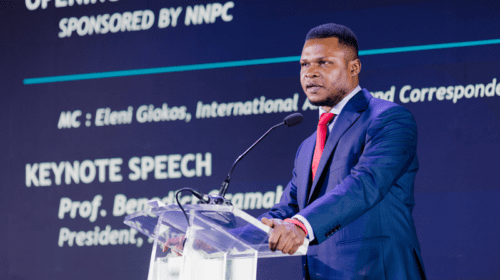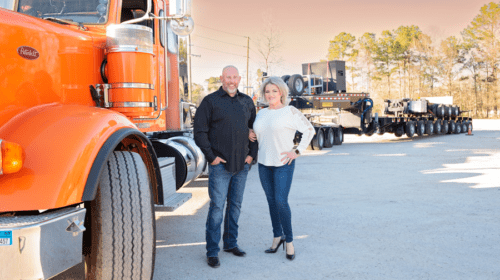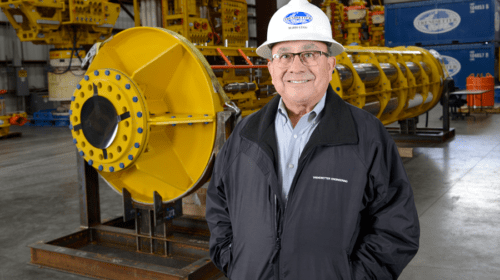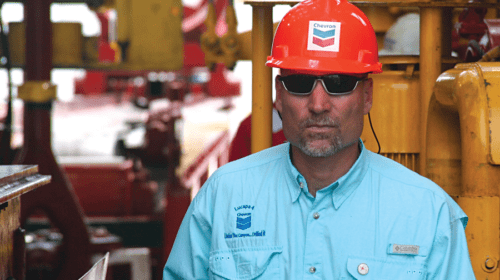Brothers David and Doug Lawler are not twins, but their careers have run on twin paths. With the technological developments in the energy industry, those may be digital twin paths in the future.
Throughout history, going as far back as Biblical times, there are well-known instances of the competitive nature of brothers: Cain and Abel, Jacob and Esau, Joseph and his eleven brothers. While that competitiveness plays out in various sporting events from college football (they’ve been called the Peyton and Eli Manning of energy) to an off-road racing team, by all appearances, the Lawler brothers seem to be working in tandem to lead the energy industry into a new era.
In January 2023, older brother, Doug, 57, assumed the role of president and CEO of Oklahoma-based Continental Resources. In late 2023, after accomplishing his mission of building a world class U.S. shale company for bp in just nine years, younger brother David, 56, decided to step down from his role as CEO of bpx Energy in search of the next great opportunity within the energy sector.
“bpx is easily now one of the very top businesses for bp,” Lawler says, “and it’s widely recognized as one of the largest and best performing onshore companies in the United States.”
Having spent the intervening months determining where his leadership skills and business acumen could best be used to guide the industry toward meeting the world’s energy needs and its net zero goals, he hasn’t, as yet, selected that opportunity. “I’m very excited about the energy transition, but I also have a deep love and appreciation for the contribution of the oil and gas industry.”
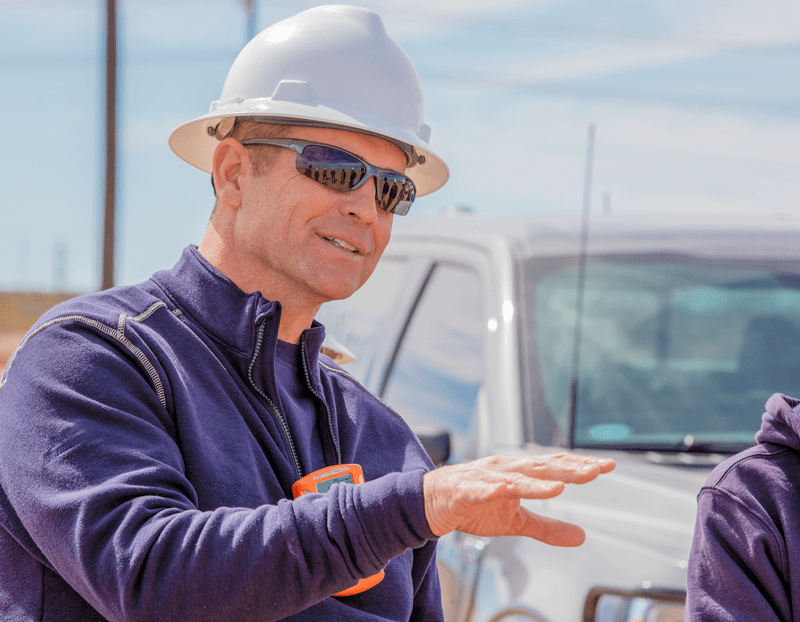
Rocky Mountain Influences
Growing up in Denver, Colorado, the two brothers were at least subconsciously influenced by one of the industry’s more flamboyant characters in choosing careers in oil and gas, which would later encompass other areas of the energy industry.
“One of the major oilfield leaders in Denver at the time was a gentleman by the name of Marvin Davis. He was always in the newspapers and half the time we might be reading about him,” Lawler says, referring to the larger than life Davis, who made his fortune with Davis Oil Company. He later moved to Los Angeles and bought 20th Century Fox, the Aspen Skiing Company, and the Beverly Hills Hotel.
“We grew up in this environment of hard work supported by our parents and seeing people be very successful in the oil and gas business,” Lawler says, “so that was the context for my brother and me going into oil and gas.”
Their father, Morris Lawler, worked the night shift as a pressman for the Denver Post, leaving home at 8 p.m. and returning at 4 a.m., and their mother, Nancy, worked a variety of jobs while raising three children (Doug, David and older sister, Susan).
“As kids, we saw this very strong work ethic from both of our parents and watched them put forth a lot of effort on our behalf. That appreciation for their hard work, and focus on our family, was something that’s always been with me.”
In addition to being a pressman, Morris Lawler was a champion chess player and a voracious reader. “We had thousands of books in our house,” David recalls, “and I fell in love with reading. He and mom both pushed us kids into math and science type degrees,” which eventually led to Doug (‘88) and David (‘90) majoring in petroleum engineering at the prestigious Colorado School of Mines.
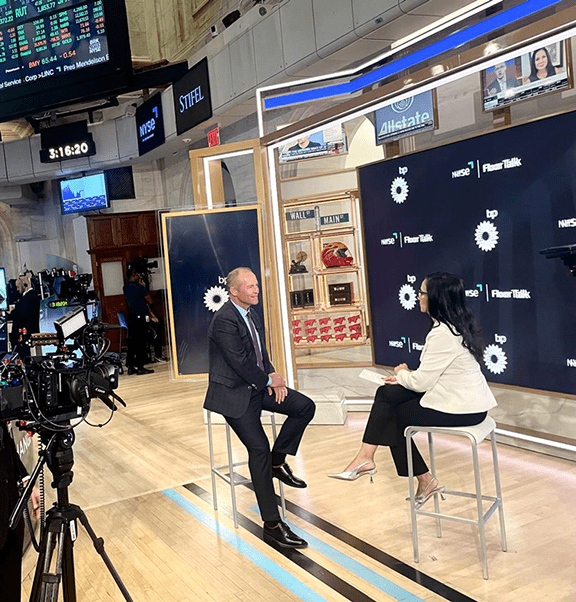
Past and Present Learning Curve
Both brothers were on the student council at Mines with David serving on the board of trustees, which is where he met Russ Wood (‘49), whom he refers to as a “key mentor.” Wood had a successful career in copper mining and, in 2003, was posthumously inducted into the National Mining Hall of Fame, where his tribute reads, in part, “Russ Wood believed that the earth’s riches should be utilized for the good of mankind and produced in the most efficient manner with the least damage to the environment…he constantly sought the better way.”
Lawler seconds those accolades. “He’d always say, “Dave, don’t be afraid to take one step back to go two steps forward,” and what he meant by that was that success and progress aren’t necessarily linear. He taught me grit, determination, and how to navigate the difficulties along life’s way. I will always be grateful to Russ Wood for that.”
While successful business people often look to their elder predecessors for wisdom and guidance, which Lawler found in Wood, he also can attest to the value of mentorship from colleagues and peers. One person he cites in particular is his contemporary, Chris Kendall, who graduated from Mines with an engineering degree and is the former CEO of Denbury Resources.
Calling Kendall, “One of the finest people you’ll ever meet, in addition to being one of the smartest,” Lawler says Kendall is always thinking about the future, even back in the days when they were students.
Kendall led Denbury, Lawler says, to the forefront of the carbon capture business, a key part of the equation to help the world reach net zero. Denbury was sold to ExxonMobil for $4.9 billion in 2023. (In March, Kendall was nominated to California Resources Corporation’s board of directors.)
“This is someone who really focuses on tomorrow and what the future looks like,” Lawler reiterates. “So, I learned from those who had been successful in business in the past, but also from my contemporaries and friends in the industry. We can learn from everyone.”

which recycles steel (Pueblo, Colorado, 2022).
Staying Ahead of the Curve
The cyclical nature of the energy industry was something Lawler learned about early in his career. He joined the industry in 1990 as it was recovering from what The New York Times in 1981 had christened the “oil glut,” a trend that continued with a decline in the price of crude for the next six years. With the beginning of the first Gulf War and Iraq’s invasion of Kuwait in August of 1990, the price of oil spiked before leveling out to pre-war rates.
With the slight increase in activity in 1990, Lawler secured his first post-college job with Conoco in Houston, Texas, in a production technology role. “We were trying to optimize facilities and flow rates and ensure that we had the most value possible from a production stream,” which was a valuable learning experience for the young graduate.
It was also when he encountered his first downturn. Conoco offered him a job in San Angelo, Texas, but another opportunity caught his attention and seemed to be an early indication of Lawler’s intuition for spotting industry trends.
“There was this very unique company called Burlington Resources that was doing some industry leading work called horizontal drilling in the Bakken Shale.” He was hired as a drilling engineer in Denver to drill horizontal wells for Rick Moncrief (currently the CEO of Devon), whom he refers to as “a super individual and a dear friend to this day.”
True to the cyclical nature of the industry, there was another downturn, and “the new future was going to be deep water,” Lawler says. He left Burlington for an opportunity as a deep water drilling engineer with Shell. “While I was there, I had access to some of the finest engineers in the world. Shell sent me back to get my MBA from Tulane, which I’m still grateful for to this day.”
Upon graduating, Shell sent him to work for the president and CEO of Shell E&P Company, Raoul Restucci. Although the official title has since been forgotten, Lawler was a business analyst for the CEO support team, writing speeches and presentations, before moving on to his next role on the capital allocation team, helping determine where Shell’s capital would be directed in the Western Hemisphere. Calling it “a really great job with an exceptionally well run company,” Lawler says, “I absolutely loved it.”

Strategic Career Moves
His career then took what some might see as a strange turn, if not for that prescient intuition. Lawler left the super major to join a very small coal bed methane company in Oklahoma called PostRock Energy Corporation.
“There was another kind of industry transition happening with unconventionals really starting to take off. Oklahoma City was at the epicenter of changes.”
In a few short years, he helped write the S-1 that would take the company public. Although the market crash in 2008 and ensuing low oil prices were detrimental to the future of the company, with PostRock ultimately filing for bankruptcy reorganization in 2016 (long after Lawler was gone), he calls it “a valuable learning experience.”
After four years at PostRock, Lawler joined Sandridge as its chief operating officer (COO) and EVP of Operations, a move he was particularly excited about given the high volume of activity of the company, which was running 45 rigs at one time.
“It was pretty intense. We learned how to become very capital efficient. It was a high energy company. At the peak, we had an annual capital budget of around $2.5 billion dollars, which is a massive expenditure for a company our size.”
A phone call from bp in 2014 would become a watershed moment in Lawler’s career.
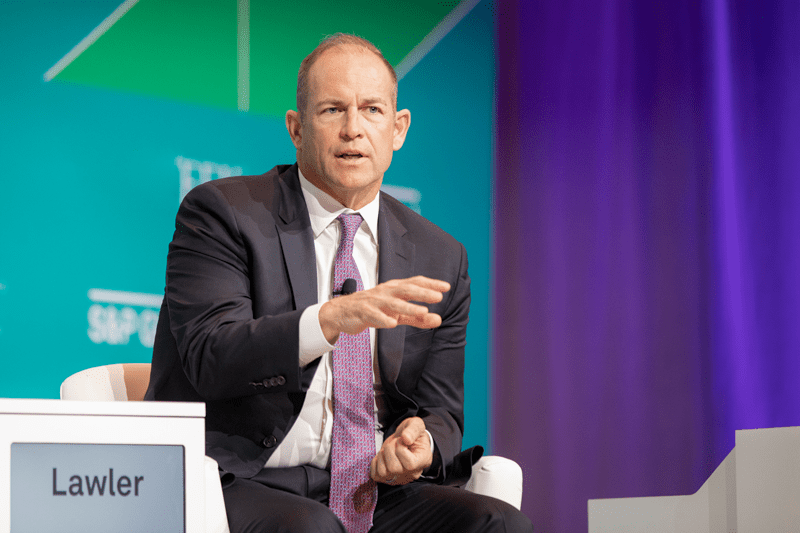
“Navigating a Turbulent World: Energy, Climate and Security” (Houston, Texas).
Exploration of New Ideas
The company was interested in putting together a world class U.S. onshore team but, at the time, had limited experience with unconventionals. Lawler was brought onboard as CEO of the newly created business. He renamed the company bpx Energy (with the “x” representing the “exploration of new ideas”), relocated the company headquarters to Denver, Colorado, to attract a new generation of talent, and was tasked with building a high performing team. Along with internal hires, the team identified external talent with deep frack knowledge, horizontal drilling technology, and unconventional geoscience skills. Lawler implemented rigorous business reviews every 30 days that covered all safety, environmental, operational and financial performance metrics of the company.
“We made such rapid and significant progress that the company felt confident buying BHP’s onshore assets for $10.5 billion in October 2018 and then put that under the management of the bpx team. Over the course of five years, we increased the production from 180,000 barrels a day to 420,000 barrels a day, on the way to 6000,000 barrels per day in the future. That’s stellar,” Lawler says, estimating that the company accounts for close to 20 percent of bp’s production and would command a $25 billion valuation as a stand-alone company. “I’m super proud of the bpx team.”
Another unique aspect to the new company was that the entire Permian Development Leadership Team was female, helmed by Heather LaReau, who holds a PhD in geoscience, although it may not be a complete surprise, considering that in 2022 bp became the first (and only) major to have a female majority in executive leadership.
“We put Heather in charge of that team and they’re drilling some of the very best wells in all of the Permian basin under her leadership,” Lawler says. “Everyone needs someone to believe in them: People from different backgrounds, different colors, different genders. There were many people over the years who took a chance on me. As a leader, you need to step forward into that space.”
Stepping Forward
“Along the way, I had the opportunity to become the chairman of bp in the U.S.,” Lawler says of his 2020 appointment to the top role. One of his first actions was to formalize Martin Luther King Day, which had been a federal holiday for 40 years, as a company holiday.
Listening to employees, gender neutral bathrooms were installed. “We stepped forward. We wanted everyone to feel welcome and, everywhere I’ve ever worked, we want that location to be the one place that you can come and be yourself, feel safe and contribute your best.”
In Lawler’s capacity as CEO, he also helped formulate bp America’s strategy for the energy transition which included renewables, EV charging, hydrogen, production, refining and carbon capture. “I had an opportunity to be involved with so many great leaders and help set up the company for the next 100 years.”
With bp’s future secure (as much as any company can be given the vagaries of the industry), it’s not surprising Lawler set his sights on his next challenge, deciding to step down as CEO in October 2023 and let his world class team take it forward. “I think there are at least five to six women and men working in bpx right now that can be public company CEOs in the future.”

Listen First
While Lawler was at bp, the company, along with the other super majors, set ambitious goals to reach net zero. However, once the magnitude and reality of the challenge set in, they then had to walk back some of those targets.
“My belief is that climate change is real,” Lawler says. “I think it’s very important that all companies set ambitious targets to hit net zero and then, in good faith, pursue that.” In this case, that means addressing the facets of the energy trilemma: environmentally sustainable, affordable and reliable energy.
“Everybody deserves clean energy,” Lawler says, “and I firmly believe that people with challenged backgrounds disproportionately pay for climate change. So, really, there should be this commitment from all of us who can lead and influence policy.”
“How do we help each other be successful?” he asks rhetorically. He explains that his approach has always been to “listen first” and try to understand other points of view. Given his conviction that the current problems facing society can neither be solved quickly nor individually, he believes, “If that one approach was truly utilized by everyone, I think we could come together, find common ground, and be very productive.”

Natural Gas: Energy’s Superpower
The brightest minds are needed to come up with those solutions and, according to Lawler, “Our greatest risk to the petroleum graduate is computer science.”
A former student trustee, he now sits on the board of the Colorado School of Mines as an industry professional, and says the number one degree field at the school is computer science, making it critical to emphasize to students that energy is vital to the future.
The U.S. has a well-developed technology sector but, as Lawler points out, “We also have the world’s leading energy sector. This is something that the country should be very proud of. Our energy sector is very advanced, and has significant natural gas reserves that can help our businesses – and the world – decarbonize.”
Lawler is firmly convinced that natural gas is going to be more important in the future than some might perceive due to the ever-increasing demand for electricity, as well as natural gas being the primary component of creating fertilizer and other ammonia products, using the Haber Bosch process developed by Fritz Haber in 1913, which involves gray hydrogen.
“The natural world cannot support eight billion people without fertilizer,” Lawler points out, estimating that ~20 percent of the world’s population is linked to a process that was created over 110 years ago. “This is where natural gas is going to become very important to the world well beyond heating and cooling, the uses that most people are familiar with.”
“What’s important about this process that I don’t think has been fully appreciated is that the Haber process is reversible, enabling hydrogen distribution through conventional infrastructure” he says, going on to explain that by combining carbon capture technology with fertilizer production and injecting the carbon that is a byproduct of creating ammonia, the U.S. Gulf Coast storage and processing terminals then can be used to ship green products across the world for the use of hydrogen.
“There’s so much more to the natural gas story. The natural gas reserves in the U.S. are so significant that being able to use the resources we have, combined with carbon capture, can make a very big difference in lowering emissions across the world, helping countries and entire populations reach net zero.”
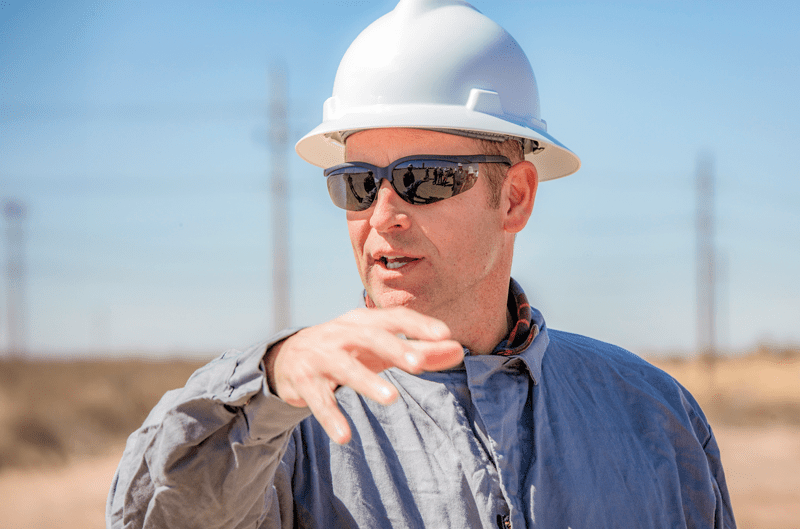
Brave New Future
Given Lawler’s uncanny ability to spot and join the “next big thing,” one has to wonder where that will lead him. “I don’t think it’ll just be one technology,” he says decisively. “There are going to be many breakthroughs that are helpful to society.” He believes numerous variables are going to come into play and energy will come from a wide variety of sources.
“I think a lot of people see problems through a binomial lens – on/off, up/down, right/left. I go back to my days in statistics and Bayes’ theorem, which lets you update the probability of outcomes based on new information. As each new technology steps forward, it changes the probability of another technology being successful.”
“You have to think of it in terms of where the future is taking us.” Expect Lawler to be one step ahead, leading the way.
Mark A. Stansberry, Chairman of The GTD Group, is an award-winning author, columnist, film and music producer, radio talk show host and 2009 Western Oklahoma Hall of Fame inductee. Stansberry has written five energy-related books. He has been active in the oil and gas industry for over 44 years, having served as CEO/President of Moore-Stansberry, Inc., and The Oklahoma Royalty Company. He has served as Chairman of the Board of Regents of the Regional University System of Oklahoma, Chairman 2016-2017 of the Gaylord-Pickens Museum/Oklahoma Hall of Fame Board of Directors, Lifetime Trustee of Oklahoma Christian University, and Board Emeritus of the Oklahoma Governor’s International Team. He has served on several public and private boards.
Rebecca Ponton has been a journalist for 25+ years and is also a petroleum landman. Her book, Breaking the GAS Ceiling: Women in the Offshore Oil and Gas Industry (Modern History Press), was released in May 2019. For more info, go to www.breakingthegasceiling.com.
Oil and gas operations are commonly found in remote locations far from company headquarters. Now, it's possible to monitor pump operations, collate and analyze seismic data, and track employees around the world from almost anywhere. Whether employees are in the office or in the field, the internet and related applications enable a greater multidirectional flow of information – and control – than ever before.

